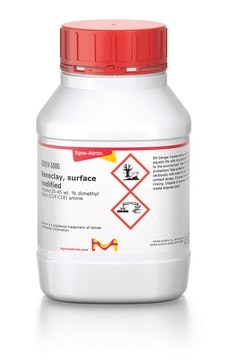All Photos(1)
About This Item
CAS Number:
EC Number:
MDL number:
UNSPSC Code:
12352300
PubChem Substance ID:
NACRES:
SB.52
form
powder
Quality Level
storage temp.
room temp
SMILES string
O.O=[Si]=O.O=[Si]=O.O=[Si]=O.O=[Si]=O.O=[Al]O[Al]=O
Looking for similar products? Visit Product Comparison Guide
General description
Bentonite is comprised primarily of the smectite group (montmorillonite) of clay minerals. It is widely used in various industrial applications such as clarification of edible and mineral oils, paints, cosmetics, and pharmaceuticals. It is also used as an adsorbent for the elimination of pollutants from wastewater.
The swelling property of bentonite is used to produce viscous water suspensions for bonding, plasticizing, and suspending applications. The presence of a large surface area of bentonite is due to the colloidal dispersion of the particles is the main reason for its application as an insecticide carrier, an emulsifier, and an emulsion stabilizer.
The swelling property of bentonite is used to produce viscous water suspensions for bonding, plasticizing, and suspending applications. The presence of a large surface area of bentonite is due to the colloidal dispersion of the particles is the main reason for its application as an insecticide carrier, an emulsifier, and an emulsion stabilizer.
Application
- Optimization of Cd (II) removal from aqueous solution by natural hydroxyapatite/bentonite composite using response surface methodology.: This study explores the use of a hydroxyapatite/bentonite composite for the efficient removal of cadmium ions from aqueous solutions, highlighting its potential application in environmental remediation (Desalegn et al., 2023).
- Acid-activated Sodium Bentonite and Kaolin Clay: Comparative Study by Physicochemical Properties.: This research compares the physicochemical properties of acid-activated sodium bentonite and kaolin clay, focusing on their potential applications in various industrial processes and environmental treatments (Kumar & Lingfa, 2020).
- Photochemical synthesis of silver nanoparticles on chitosans/montmorillonite nanocomposite films and antibacterial activity.: The research focuses on the synthesis of silver nanoparticles on chitosan/montmorillonite nanocomposite films and their enhanced antibacterial activity, suggesting potential applications in medical and environmental fields (Gabriel et al., 2017).
wgk_germany
WGK 3
flash_point_f
Not applicable
flash_point_c
Not applicable
Certificates of Analysis (COA)
Search for Certificates of Analysis (COA) by entering the products Lot/Batch Number. Lot and Batch Numbers can be found on a product’s label following the words ‘Lot’ or ‘Batch’.
Already Own This Product?
Find documentation for the products that you have recently purchased in the Document Library.
Customers Also Viewed
Applications of Bentonite in the Industrial Wastewater Treatment [J]
Xiaotong G and Zhiming Z
Chemical Production and Technology, 3 (2006)
Adsorption of methylene blue from aqueous solution by crosslinked chitosan/bentonite composite.
Bulut Y and Karaer H.
Journal of Dispersion Science and Technology, 36(1), 61-67 (2015)
Yuwen Huang et al.
Mutation research, 751(1), 40-44 (2012-11-08)
It has been found that bentonite particles (BPs) could induce the cyto-genotoxicity and oxidative stress in vitro, but these effects on population exposed to BPs remain unclear. The aim of the present study was to investigate whether the genetic damage
Shilong He et al.
Environmental technology, 33(19-21), 2337-2344 (2013-02-12)
Bromate is an emerging hazardous substance in drinking water. In this study, the removal ofbromate by Fe-pillared bentonite was investigated using various experimental parameters: contact time, initial concentration (Co), temperature, initial pH and competing anions. The adsorption ofbromate followed the
Laurent J Michot et al.
Langmuir : the ACS journal of surfaces and colloids, 29(10), 3500-3510 (2013-02-21)
The coagulation of sodium montmorillonite by inorganic salts (NaNO3, Ca(NO3)2 and La(NO3)3) was studied by combining classical turbidity measurements with wide-angle-X-ray scattering (WAXS), small-angle-X-ray scattering (SAXS), and transmission X-ray microscopy (TXM). Using size-selected samples, such a combination, associated with an
Our team of scientists has experience in all areas of research including Life Science, Material Science, Chemical Synthesis, Chromatography, Analytical and many others.
Contact Technical Service


